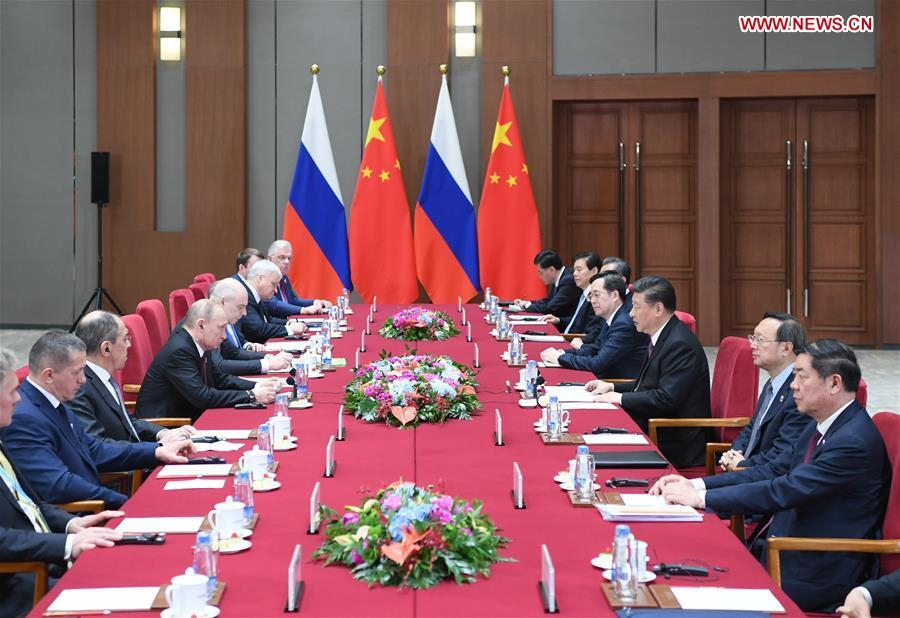
Russian President Vladimir Putin speaks at his annual press conference in Moscow, Russia, December 19, 2019. /Xinhua Photo
Russian President Vladimir Putin speaks at his annual press conference in Moscow, Russia, December 19, 2019. /Xinhua Photo
Editor's note: Andrew Korybko is a Moscow-based American political analyst. The article reflects the author's opinions and not necessarily the views of CGTN.
Russian President Vladimir Putin held his 15th annual end of the year press conference on December 19 where he spent over four hours fielding questions from a host of Russian and foreign journalists, most of which had to do with his country's domestic affairs though some did touch upon international issues.
On the domestic front, Putin emphasized the strength of the Russian economy, remarking that his country is now the world's largest agricultural exporter and is making great strides in its military-industrial sector that he says is one of the driving forces of innovation.
The Russian president emphasized in response to a question that it's totally wrong to say that Russia is relying on outdated infrastructure from the Soviet period, rattling off a score of statistics proving just how much progress it's made since the USSR's disintegration in 1991 and especially in the last decade.
More recently, he drew attention to the National Development Projects that he unveiled last year following his re-election to a fourth term as president, talking about how they'll influence every aspect of Russian life and will positively contribute to the growth of all socio-economic sectors.
Unlike what some might have predicted nearly six years ago at the onset of the West's anti-Russian sanctions, Putin said that his country has successfully practiced a policy of import-substitution that helped mitigate adverse effects to its economy.
Putin also commented on the progress that Russia is making on artificial intelligence (AI), which he was asked about during the conference since he previously said in 2017 that "whoever leads in AI will rule the world."
Putin informed the audience that Russia's strong educational base and historic focus on mathematics and science ensure it a top position in this strategic sector, which he also said is vital for guaranteeing its future national security needs.
Of global relevance, the Russian leader reaffirmed the importance of his country's unprecedented level of trust with China which he says is a stabilizing factor in an increasingly uncertain but progressively multipolar world.

Chinese President Xi Jinping holds talks with his Russian counterpart Vladimir Putin on the sidelines of the Second Belt and Road Forum for International Cooperation in Beijing, China, April 26, 2019. /Xinhua Photo
Chinese President Xi Jinping holds talks with his Russian counterpart Vladimir Putin on the sidelines of the Second Belt and Road Forum for International Cooperation in Beijing, China, April 26, 2019. /Xinhua Photo
Putin added that the U.S. unipolar vision was ultimately proven to be nothing more than an illusion since there's no denying that China's growing economic influence will inevitably have an impact on changing international relations, which he regards as a very positive development.
Another point of pertinence is that Putin expressed how strongly he disagrees with the outdated bloc-based mentality of some countries. He told everyone that interpreting Russia's comprehensive and strategic partnership with China as representing an unofficial "military alliance" was incorrect, but defended Moscow's military cooperation with Beijing, especially in respect to the early warning system that his country is helping it to build for detecting incoming missile strikes. Putin said that it's purely defensive so nobody should fear it.
One can interpret his comments about China as being the epitome of pragmatism and responsibility. Russia and China are playing leading roles in the ongoing global system transition, and their extremely close relations with one another are counteracting the U.S.' aggressive actions in attempting to advance its unipolar agenda across the world through a variety of means including its economic protectionism that Putin also spoke out against. Keeping the larger context of his press conference in mind, something very important can be implied.
The Russian leader spoke about his intent to double bilateral trade with China to 200 billion U.S. dollars in the coming future, and considering their trusted geopolitical and military partnership, it's only natural that the economic dimension of their relations continues to flourish. Closer Russian-Chinese trade ties wouldn't just have a global economic impact, but could also greatly assist Putin's plans to continue his country's diversification program, which would benefit all his countrymen and truly make Russia an economic force to be reckoned with.
(If you want to contribute and have specific expertise, please contact us at opinions@cgtn.com)